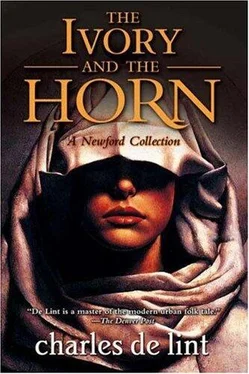They could be seen, if you had more than ordinary sight. Or you might see only what you expected to see, what you wished to see. Jean saw a prostitute on the run, in trouble with the law, or with her pimp; perhaps both. Standing at her kitchen window, Hannah Silverstein looked up from her sinkful of dishes to see her neighbor befriend a pretty girl in a pink sweater and a modest skirt that hung just below her knees. The stranger had thick chestnut hair failing free to her shoulders, eyes that seemed as luminous as moonlight, and Hannah was happy for Jean because she had always thought of him as such a nice, pleasant man, but too old at twenty-seven to be living on his own. Too lonely. It was time he met himself a nice girl like this and settled down.
That was what Hannah saw, but then Hannah had her own preconceptions concerning what she expected to see in the world. She once met the great god Pan at the reception following Janet Carney's wedding and thought him a quaint little man who had imbibed perhaps too much wedding cheer.
"Pan is dead," he told her, lifting his glass to clink its rim against hers. "Long live Pan,"
But she thought he'd said, "What a spread— long live Jan."
Perhaps it was his accent. Or perhaps, as many of us will, she used a similar filter to listen to him as the one through which she viewed the world.
4
Jean's own perception of his houseguest changed as he came to know Candida. That first autumn day when he returned home from work, not even expecting her to be in his apartment anymore, she had already undergone a slight alteration from the woman he remembered meeting the previous night. She was still sexy, he could still picture her gracing the cover of an issue of Spicy Detective Stories, but she no longer seemed cheap, her sexiness was no longer so blatant. She must have gone out while he was at work, he thought, for while she hadn't even been carrying a purse last night, today the tight dress and heels were gone, the makeup far more subdued. She wore, instead, a loose cotton dress with a flower print more suitable to summer than the fall.
"You look different," he said.
"So do you."
It was true. Last night he'd been wearing casual slacks and a short-sleeved polo shirt. But the difference seemed to run deeper in her— beyond a mere change in clothing.
"That's not what I meant," he began.
He was going to go on to tell her that he was dressed for work now, while last night he hadn't been, that he had a chest of drawers and closet full of different clothes into which he could change, while she'd come into his apartment with only what she was wearing, nothing more. But then he smelled the air.
"You made dinner," he said, unable to hide his delight. The last time he'd come home to dinner was when he was still living with his parents, years ago. He looked in the oven, his smile broadening. "Shepherd's pie. It's my favorite."
"I know."
And Jean forgot the anomaly of her wardrobe, never thought to ask how she might know his favorite dinner. It was as though someone had found the room in his mind that housed his curiosity and simply turned off the light and closed the door quietly behind them as they left. The riddles remained, but his questions were gone, just like that.
5
In older, more superstitious days, it might have been said that Candida had bewitched him, for theirs was a whirlwind romance— especially at that time, in that community. They met in September, but the odd circumstances of that meeting had been forgotten. They were married in January, a quiet civil ceremony, because neither had any other family. They had their first and only child late the next September and named her Sophie.
Jean didn't read his detective novels and magazines anymore— he didn't need other stories. At night when they lay in bed, Candida would tell him hers. She had an impossible storehouse of tales tucked away behind her eyes; like Scheherazade, she had so many, she never had to repeat one. In response, Jean felt an unfamiliar stirring in his own mind, a need to communicate his love for his wife and their child, a desire to share with them dreams that were his own, instead of the fantasies he had borrowed from his books and magazines.
Once he had carried a secret life inside him, an ongoing adventure in which he was the tall man in the trenchcoat with the brim of his hat pulled down low over his eyes, who acted when others stood by helpless, to whom the hurt and lost were drawn that he might find them justice, to whom men looked with respect and women with desire. Now the hat and trenchcoat were put aside. Now he had a child who had offered him her unconditional love from the moment he first saw her in the hospital. Now he had a wife who was not only his partner and his lover, but also his best friend. His life was so complete that he had no need for that old secret life.
6
But there was still something unusual about Candida, even if Jean could no longer see it. Though he wasn't alone in that particular blindness, for no one did— not in their circle of friends, not in the neighborhood, though no one ever did remember her quite the same. To some she was tall, to others she was of medium height. To some she had a classical beauty, others thought her a little plain. Some, when they looked at her, marveled at how she retained an unaffected girlishness, belying her motherhood and maturity; others were reminded of their mothers, or their grandmothers.
She was a charming conversationalist, and an even better listener, but it was only to Jean that she told her stories; stories, and cryptic remarks to which Jean never gave much thought until much later.
Because he'd been bewitched, some would say.
7
"Where does she go when she sleeps?" Candida murmured one evening, leaning on the windowsill in their bedroom, looking out at the moon where it hung above the brownstones of Upper Foxville. "Does she go into another world? Or does she only dream?"
She often watched the moon, noting its phases, her eyes not so much reflecting the light as absorbing it. But that night Jean wasn't looking at her. He sat on the bed, giving Sophie her bottle, and thought Candida spoke of the baby.
"If she's dreaming," he said, "I hope they're sweet dreams."
"Oh yes," Candida said, still looking at the moon. "We can only hope they're so sweet as mine."
8
Another time she told him, "If I should ever go, it won't be for lack of loving you— not you, not Sophie. It will be because I am called away. It will be because I will have no choice."
Jean thought she spoke of her death. He didn't like to consider death, little say speak of it. He held her closer to him.
"Don't even think about it," he told her.
He felt her sigh. "Sometimes I can think of nothing else."
9
One time Jean asked her how she knew so many stories, and she replied that they came from her dreams.
"We have to believe in our dreams," she said, "because without them we are nothing. Dreams are how we make sense of the world, but they're also how we remember it. When your dreams are real— if only to you— when you believe in them and make them a part of the story that is your life, then anything is possible. You can go anywhere, be anyone, mend any hurt— even a broken wing."
"A broken wing?" Jean replied, puzzled.
"We fly in our dreams. But if we break a wing, we have to work that much harder to keep them real, or they fade away." She gave him a sad smile. "But the trouble is, sometimes we heal ourselves so well that we go away all the same."
Jean shook his head. "You're not making sense tonight."
"Just promise me you'll believe in your dreams. That you'll teach Sophie to believe in hers."
Читать дальше












